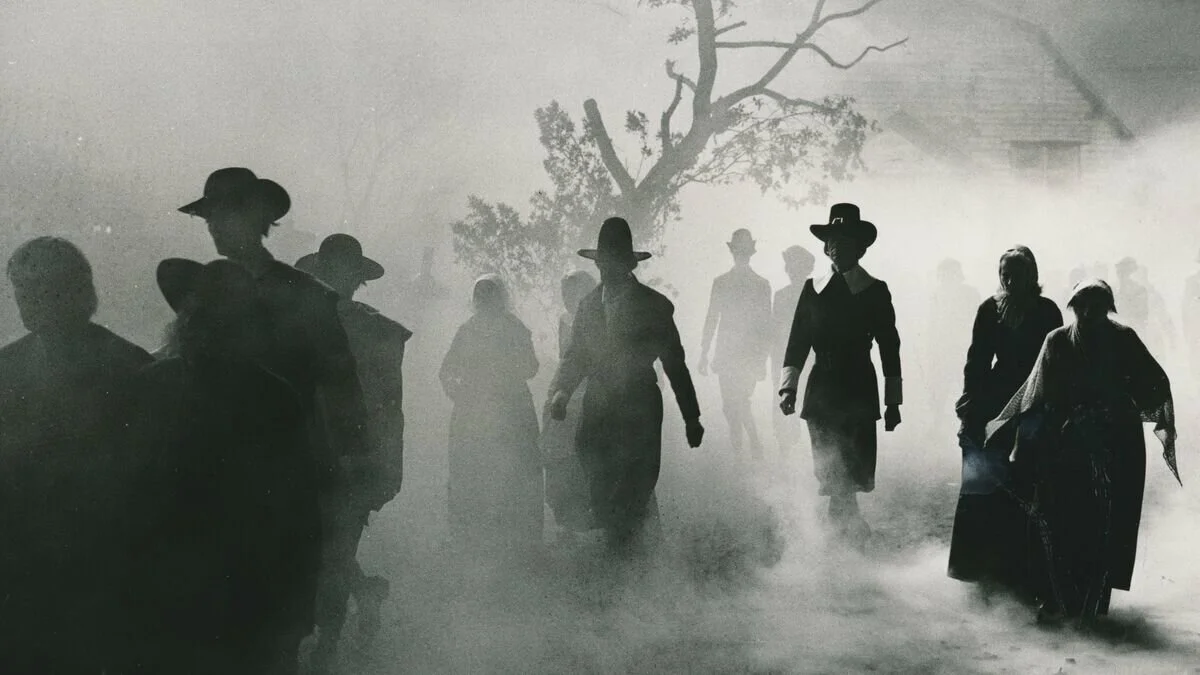Film Review — "Slaxx"
Slaxx is exactly what a horror-comedy about carnivorous blue jeans caused by the cavalier money-grubbing of the 1% ought to be. Some might say it’s preachy, but I don’t find its message to be heavy-handed whatsoever; those critics are likely to accuse any movie with a moral of being soapboxy. For a film about the evils of corporate greed, Slaxx is appropriately economical. Clocking in at under an hour and a half, the film squeezes in just the right amount of social commentary alongside plenty of gory fun. Hell, they even manage to include a dance number on a sales floor! Set in a single commercial location during its off-hours on the eve of a major product launch, the story eventually has us questioning who the true monsters are: the ones made of denim and zippers or the ones made of flesh and blood.
I worked an overnight reset in retail once… Never again, Satan. Never again. At the time, I was working for a certain well-known chain bookstore, and the general manager recruited me (read: ordered me) to help rearrange and clean the place as much as possible between closing time and the next day’s opening. There’s not a single thing we did that night that couldn’t have been done during standard business hours while people shopped. But corporations would rather an employee sacrifice their wellness and social life than delay a customer’s ability to spend.
Businesses are solely interested in making money, not fixing our world’s problems. A lot of you are probably shouting “Duh!” right now because this should go without saying—and yet there are millions of folks who insist that capitalism is the answer to all our hardships. “Make a better tomorrow today!” is the slogan of Canadian Cotton Clothiers, the fictional retailer that serves as the primary setting in Slaxx, but their perceived efforts to improve the planet are through bullshit hot-button phrases only: Fair Trade, Non-GMO, Organic, etc. It’s all a facade. No matter how virtuous they appear, they’re still in the practice of exploitation for their own gain.
The type of bloodsucking we’re more likely to see firsthand is the underpaying of employees for the level of commitment that’s demanded of them. Here in the States, retail jobs are part-time positions that pay minimum wage, offer no healthcare benefits or retirement savings plan, and schedule workers irregularly to make it more cumbersome to seek better opportunities or have a life. It’s suppression by design. They pay you just enough so you can get by-ish, but not enough so you can take a day off to interview elsewhere. And in case you are willing to take that hit, management waits till the last minute to post the next week’s schedule—to make it harder for you to arrange that interview.
Then there’s the exploitation we often talk about but seldom witness ourselves: harsh child labor from underdeveloped nations. Director and co-screenwriter Elza Kephart sprinkles hints throughout the film to suggest that this is the origin of her film’s horrors. All that “ethically sourced” and “sweatshop free” talk we hear these day? Sure, Jan…
Customers and workers alike fall for that shit. Folks will flock to their favorite big box stores week after week—to remain loyal to their chosen brands—because consumerism is a hell of a drug. The funny thing, though, is that while we may love our dealers—I mean, stores—they do not love us back. And they certainly don’t love their employees, either. How many businesses put up signs declaring “Heroes Work Here!” during the pandemic? (Mine did.) And how many of those same businesses offered their “heroes” hazard pay, or a permanent raise, for risking their health every day for the sake of tHe EcONoMy? (Mine didn’t.) It continues to blow my mind how frequently I encounter coworkers who wholeheartedly worship corporate.
It’s for this reason that Brett Donahue’s Craig is my favorite performance in Slaxx. Donahue acts as a radiator for the film’s shrewd tone. A despicable, borderline psychopathic person, Craig is a perfect villain for this “ecosystem.” He’s so determined to be a regional manager that he’ll stop at nothing to climb that twisted ladder, no matter how much carnage he stumbles upon. Assholes like Craig are the worst bosses to work for, and in many ways he’s the real antagonist of this story—if we’re not assigning that role to an abstract brainy concept like… colonial capitalism. This film seems ripe for that “the movie villain / the actual villain” twitter meme. Only instead of the inevitable Miranda Priestly and Andy’s Boyfriend pairing it’s these killer jeans and Craig.
Yes, the jeans kill people. But, like… not without reason. As Slaxx entered the final 15 or so minutes of its brisk 77-minute runtime, I found myself staunchly on the side of the pants. I mean, I’m a pint-size homo who seldom finds trousers that are both the correct length and can effectively accentuate my petite peach, so I was already bemused by the Super Shapers’ ability to flatter any figure. Then learning the full backstory merely sealed the deal. Just about every slaying that had taken place prior was forgiven and officially deemed warranted.
In horror movie terms, corporate executives and their stooges deserve to die bloody deaths. But so too do the demanding and entitled shoppers willing to fork over their expendable cash for the overpriced items that keep these mega-retailers in power. And I’m glad Kephart and co-screenwriter Patricia Gomez don’t skirt that issue, either. The idea of consumer culture is embodied mainly in the form of an influencer named Peyton Jules. Erica Anderson plays her excruciatingly well. If you want to know everything that’s wrong with society, look no further than “influencers.” This film is full of characters whom we can’t wait to see slaughtered, and Peyton Jules is definitely one.
Honestly, this movie had me at “possessed jeans murder people.” I was afraid of how repetitive the deaths might get, but the filmmakers come up with some creative and amusing ways for sentient garments to end any person complicit in the immoral manufacturing of them. Beneath the severed limbs and puddles of blood lies a salient message of international human rights that adds to the film’s narrative purpose without distracting from the jocular violence. It’s not exactly the most terrifying film of the year, but if you’re someone who’s ever felt an unfortunate pinch while zipping up your britches… beware, you might experience flashbacks.






